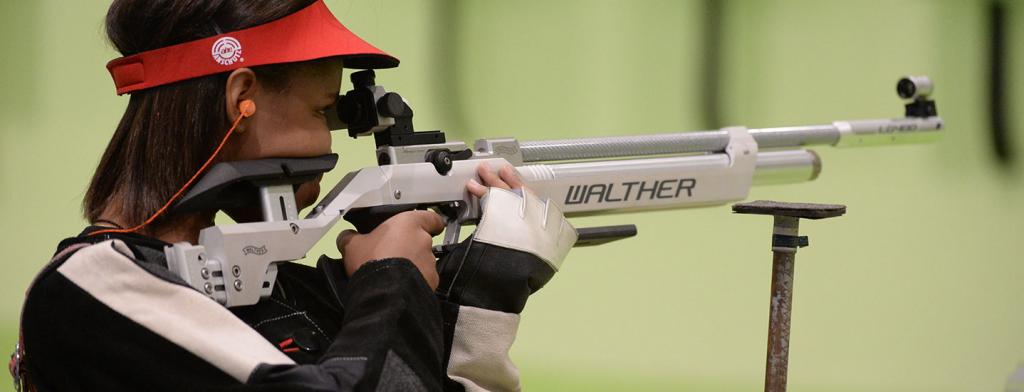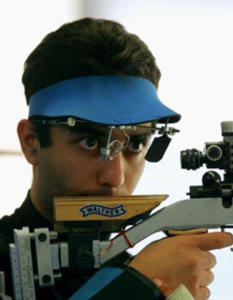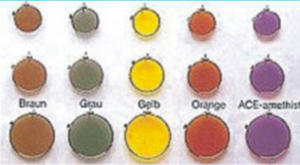BOOK ONLINE NOW
Aphrodite Livanes Optometrists is just 15 minutes’ drive from the Belmont Shooting Complex and Queensland Rifle Association at Chandler, on Brisbane’s southside – conveniently located to help you with prescription shooting glasses as well as vision tips for the range.
Even if you don’t normally require prescription lenses, there is much that a behavioural optometrist may be able to do to improve your vision, and therefore your potential at the shooting range.
When shooting, accuracy depends on the eyes’ ability to gauge the separation of two objects – sight and target – and recognise symmetry.
The rifle shooter requires optimal contrast between the foresight ring and aiming mark, and to be able to consistently maintain sight alignment. This can be supported through prescription shooting glasses, which are chosen following careful consideration of: choice of iris opening; foresight ring size; eliminating reflections and glare; and trialling various filters.

For the health and protection of your eyes, sunglasses and safety glasses with non-reflective lenses should be used when shooting. Ideally, lenses and filters should be easy to clean, as dusty lenses can cause errors and strain.
Visual aids such as shooting frames and lenses, rear sight lenses and contact lenses can also be used to correct refractive errors.
At Aphrodite Livanes Optometrists, we can help with sports prescription glasses, as well as prescription shooting glasses – bifocal shooting glasses – polarized shooting glasses – indoor shooting glasses – shooting glasses with magnification – shooting glasses with interchangeable lenses – clay target shooting glasses – shooting sunglasses.
The fitting of prescription shooting glasses is crucial, as the lens must be correctly centred to avoid distortion.
Shooting frames differ to normal eyewear or sunglasses, as they can be adjusted to the direction of the line of sight regardless of the shooter’s position.
If you have ever thought about prescription shooting glasses, we are here to help!
When you visit Aphrodite Livanes Optometrist about your shooting vision needs, your consultation will include a full eye examination to detect and treat a range of common eye conditions. No referral is necessary as the visual skills are assessed and if required, a program of visual training is designed to help improve the skills required for shooting.


Tints selectively filter light by absorbing it and reducing transmission – for example, amber filters blue light. Light is focused in a tighter range, chromatic blur is reduced, and clarity and contrast are enhanced.
There is no consensus on which tints are better to use, however the most acceptable are yellow and orange filters of light and medium densities.
As a rule, choose the lightest tint you can wear without having to squint or feel uncomfortable, and choose the correct tint before competition by comparing the colours on the ground before shooting. Aphrodite Livanes has worked with many shooting enthusiasts, and would be happy to assist you with filter tint selection for your prescription shooting glasses.
A visit to a Behavioural Optometrist like Aphrodite Livanes is a good idea if you are keen to improve your performance in shooting sports, regardless of whether you usually need prescription glasses.
This is because a behavioural optometrist can assist with visual therapy (also known as vision training) to help improve your visual stamina, focus, eye movement control, eye hand coordination and mental rehearsal. With the right exercises, your shooting performance is likely to benefit, and your visual fatigue should reduce.
Visualion training can help with shooting-specific strategies such as maximising your depth of field, that is, allowing the eye to concentrate on the sight picture without constantly trying to shift focus between the foresight and the target.
Floaters are particles within the eye. They are distracting if in the line of sight, but are normally ignored by the brain. Floaters appear more often with dry eye and dehydration; stress and fatigue can also bring them into consciousness. Simple treatments include relieving fatigue, treating dry eye, staying hydrated and flicking the eye before firing to move the floaters away.
If you are suffering from dry eye, it can result in blurred vision, reduced image quality and hence visual performance. Treatments include taking vitamin supplements, using tear supplements, cooling eyes with cold compresses, refreshing lids with saline lid scrubs, and wearing sunglasses for protection from wind and glare.
Protecting the eye from excessive light helps prevent eye fatigue. In shooting sports, this can be done by blackening any bright spots or reflections in the fields of vision, on the surface of the gun or sights. A foresight tunnel can be fitted with extensions front and back to reduce glare, while rubber eye cups on the sight can eliminate bright sunlight from the side or rear. To prevent barrel reflections, cover with cloth tape or mirage band, and use a Mac-cap style of hat to protect the eyes from bright sunlight. During intervals, use sunglasses to rest the eyes.
When aiming, the same receptors are at work and danger of fatigue is significant. An after-image may occur from fatigued receptors.
It is important to manage eye fatigue during shooting by avoiding shifting the point of focus too frequently, and taking care not to prolong aiming (5-8 seconds maximum). Other tips include trying to blink normally, avoid staring, look away during pauses, and rest the aiming eye by scoping with the non-aiming eye. When checking inner position, some close eyes, others prefer to avoid pupil fluctuations by looking down with an unfocused gaze at a dull surface which has even tones of grey (least photo receptor activity), green or blue.
An eye examination should be done at least every twelve months and can generally be bulk-billed to Medicare.
Come prepared by bringing your current spectacles, any shooting lenses, your firearm where necessary, and measurements of your sight radius and eye relief.
© 2026 Aphrodite Livanes Optometrists Alexandra Hills Brisbane. All rights reserved.